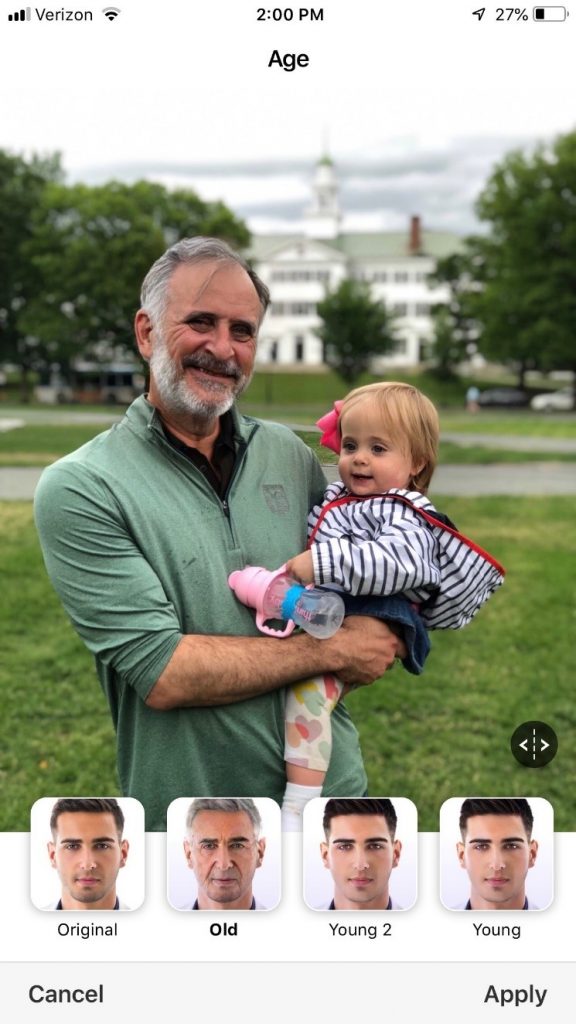From Russia, With Love?
About a week ago, my phone started buzzing. With two young kids, my social life isn’t exactly hopping these days, especially on weeknights. Who was bored enough to be texting me, repeatedly, at 8:16 on a Tuesday night? Ten feet away, comfortably situated on the couch, sat my wife. Her face illuminated by the glow of her phone, she smiled mischievously as her thumb hit send on another message. By the time I reached into my pocket to pull out my phone, I already knew what was coming.
Earlier in the day, my wife had sent me a text. When I opened the message, I saw a photo of a creepy, grey-haired man smiling for the camera, holding my daughter in his arms. I was confused at first. Then alarmed. Then amused. Then amazed. “What app is that?!” I responded. “FaceApp.”
FaceApp blew up last week. Estimated downloads soared to over 30 million in July, up from less than 5 million in June and making the previous FaceApp craze of May 2017 (17 million downloads) seem like a blip on the radar.
What’s interesting to me about the most recent surge is not that the app went viral. It’s free to download, social by design and the technology is novel and insanely cool. What’s surprising and far more interesting is that the app went nearly twice as viral this past week as it did two years ago.
To say the landscape surrounding technology and privacy has shifted in the past two years would be a bit of an understatement. In the post-2016, post-Mueller, post-Cambridge Analytica, fake news, anything-can-be-hacked world we live in, why are we still so eager to hand over access to our most intimate, private data to a company we’ve never heard of and that happens to be based in Russia? Isn’t anyone at least a little concerned by this?
To shed some light on that question, we polled 1,000 US adults last Friday. Here are some of the highlights, or as we like to call them at PSB, the Insights that Count™:
- FaceApp’s reach went far beyond the people who downloaded the app. Roughly 2 in 10 Americans reported personally downloading FaceApp, but 6 in 10 say they’ve seen these types of photos shared by friends or family.
- Most who downloaded FaceApp did so in spite of privacy concerns. Over 60% said that before they installed the app, they had concerns about it accessing their photos.
- People don’t know, or seem to care, who developed the app. 49% admit they don’t know which company developed the app, and nearly all of the rest assume it was one of the big American tech companies.
- The Russia connection elevates concern. Concern about the apps’ access to user photos jumps to 77% when people learn a Russian company (Wireless Lab) developed the app.
So basically, people have privacy concerns about the app but decide to download it anyway because it’s cool and their friends are using it. When they find out the company they just handed their photos over to is Russian, they’re more concerned, maybe even enough to delete the app. That was exactly my experience. And my wife’s too, despite her initial enthrallment.
But have we learned nothing in the past two years? Despite all the public outcry and congressional hearings about privacy, we still can’t resist the impulse to download a cool but in-no-way essential app without reading the terms or knowing anything about the company that made it. Our behaviors still need to catch up to our concern.
If there’s a silver lining, FaceApp may be doing us all a favor by providing a real and relatable example of how far AI and machine learning have come. Perhaps, it’s preparing us for the role so-called “deepfakes” will play in 2020. After thinking about what FaceApp can do, 81% of Americans we polled said they’re concerned that foreign countries could use similar technology to interfere in the 2020 elections. Get ready for hyper-realistic photos and videos of presidential candidates doing and saying pretty much anything an algorithm tells them to. Most people felt they could at least discern what was fake in 2016. I’m worried that will no longer be the case by the time 2020 rolls around. And I’m getting grey hair just thinking about it…
